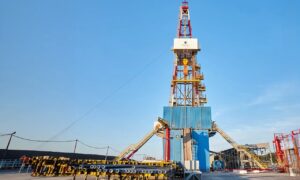
Ukrgasvydobuvannya JSC has drilled and launched a well with a daily flow rate of 439 thousand cubic meters of gas, the press service of Naftogaz Group reported on Friday.
According to the press service, the 5,767-meter-deep well was drilled as an exploration well to clarify the geological structure and assess the gas content of deposits in one of the recently discovered fields.
The well was drilled in September 2023 by Ukrburgaz drilling department.
“Naftogaz continues to increase its own gas production even in times of war. We recognize the importance of increasing production for the country’s energy independence and sustainability, as well as the stability of the upcoming heating season. I am grateful to the team for the result,” said Oleksiy Chernyshov, Group CEO.
According to Oleg Tolmachev, Head of UGV, the results obtained mean that the field will be further exploratory drilled to increase the raw material base and production volumes. “We have completed drilling two more exploration wells at the field. They are currently being prepared for testing,” he added.
As reported, in January-May 2024, Ukrgasvydobuvannya launched 36 new gas wells, 11 of which are highly productive and produce more than 100 thousand cubic meters of gas per day.
In 2023, UGV launched 86 new wells, 24 of which have an initial flow rate of more than 100 thousand cubic meters.
In 2022, UGV produced 12.5 bcm of natural gas (commercial), which is 3% less than in 2021. In 2023, the company produced 13.224 bcm of commercial gas, which is 0.679 bcm more than in 2022.
NJSC Naftogaz of Ukraine owns 100% of Ukrgasvydobuvannya shares.

Metinvest Group’s Kametstal Iron and Steel Works (Kamianske, Dnipro Oblast) has installed a new single-stage blower in cooperation with YASNO Energy Efficiency, which will help reduce energy consumption and cut operating costs in the process of blast furnace gas injection at gas-assisted compressor station No. 6.
According to the company, the new gas blower, which plays a key role in the technological process of transporting blast furnace gas of the required performance and pressure parameters for rollers, has an average electricity consumption of 200 kWh, taking into account the efficiency of the electric motor and control system. The capacity and pressure control is ensured by the installed guiding apparatus and a 0.4 kV frequency converter. The control systems are individually designed on the basis of a Siemens controller to operate in automatic mode within the specified performance range.
It is specified that the hourly power consumption of the previous equipment averaged 650 kWh. With a nominal capacity of 850 kWh, it required manual adjustment of the required parameters, which also reduced the stability of maintaining the required performance parameters and pressure of blast furnace gas in the existing pipelines through which it is transported to the heating furnaces of the pipe billeting mill.
A modern European-made supercharger was installed at the existing industrial site. Thanks to the optimal solutions implemented by the company’s power engineers, the maximum amount of available process equipment was used. Along with the dismantling of the previous equipment, the contractors relocated existing utilities, reconstructed the electrical room, and laid a new cable line from the substation to the gas compressor station 6.
“Kametstal was established on the basis of PJSC Dnipro Coke and Chemical Plant (DKKhZ) and PJSC Dnipro Metallurgical Plant (DMK).
According to the 2020 report of Metinvest Group’s parent company, Metinvest B.V. (Netherlands) owned 100% of the shares in DCCP.
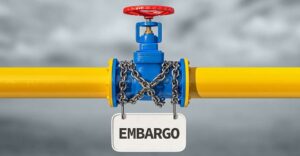
Despite the fact that the EU has sharply reduced the amount of Russian gas it imports, significant volumes are still flowing into the bloc. More than two years after Russia launched its full-scale invasion of Ukraine, its gas is still flowing into Europe.
Although the European Union has significantly reduced the amount of gas it imports from Russia, the hydrocarbon still powers some European homes and businesses, thus increasing the Kremlin’s revenues.
When the war broke out, European leaders were forced to reckon with their long-established dependence on both Russian gas and oil. Gas was a particular problem, as in 2021, 34% of EU gas came from Russia.
Central and Eastern European countries were particularly dependent. When the EU proposed a ban, German Chancellor Olaf Scholz was quick to speak out against it. “Europe has deliberately removed energy supplies from Russia from the sanctions. At the moment, Europe’s energy supply for heat production, transportation, electricity and industry cannot be ensured in any other way,” he said.
Vladimir Putin took advantage of this. Throughout 2022, Russia reduced gas imports to Europe. European leaders feared a winter energy shortage. These fears never materialized, but importantly, they meant that the EU never imposed sanctions on Russian gas.
“It was never a sanction,” says Benjamin Hilgenstock of the Kyiv School of Economics. “It was a voluntary decision of the countries, and a reasonable one, to diversify their supplies and no longer blackmail Russia,” he told DW.
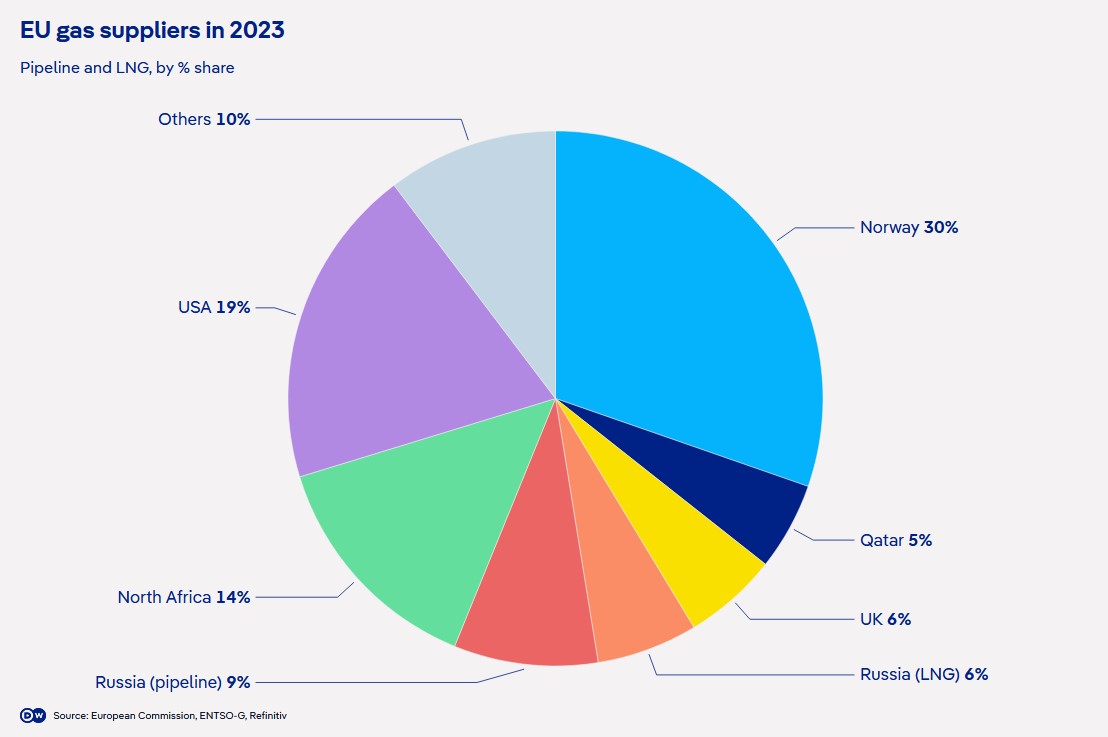
According to EU data, the share of Russian pipeline gas imported by member states has decreased from 40% of the total in 2021 to about 8% in 2023. However, if liquefied natural gas (LNG) – natural gas cooled to a liquid state so that it can be transported by ship – is included, the total share of Russian gas in the EU’s total volume last year was 15%.
One of the main ways to reduce the EU’s dependence on Russian gas has been to increase imports of LNG from countries such as the United States and Qatar. However, this has unwittingly led to a sharp increase in the supply of Russian LNG at high prices to the bloc.
According to Kpler, Russia has become the second largest supplier of LNG to the EU. In 2023, LNG imports from Russia will account for 16% of total LNG supplies to the EU, which is 40% more than in 2021.
Import volumes in 2023 were slightly down on 2022, but data for the first quarter of 2024 show that Russian LNG exports to Europe were up again by 5% year-on-year. France, Spain, and Belgium were particularly large importers. These three countries accounted for 87% of the LNG that entered the EU in 2023.
However, most of this LNG is not needed by the European market and is transshipped in European ports and then re-exported to third countries around the world, resulting in profits for some EU states and companies.
Most of the Russian LNG that comes to Europe is simply “transshipped,” says Hilgenstock. “So it has nothing to do with the supply of natural gas to Europe. It’s just European companies making money by facilitating Russian LNG exports.”
According to a recent report by the Center for Research on Energy and Clean Air
(CREA), just under a quarter of Europe’s LNG imports from Russia (22%) will be transshipped to world markets in 2023. Petras Katinas, an energy analyst at CREA, told DW that most of this LNG was sold to Asian countries.
As a result, some EU members, such as Sweden, Finland and the Baltic states, are putting pressure on the bloc to impose a complete ban on Russian LNG, which would require the consent of all member states.
The EU is currently discussing a ban on re-exporting Russian LNG from European ports. According to the Bloomberg news agency, they are also considering imposing sanctions on key Russian LNG projects, such as Arctic LNG 2, the UST Luga LNG terminal, and the Murmansk plant.
“We really should basically ban Russian LNG,” said Hilgenstock. “We don’t think it plays any significant role in Europe’s gas supply, or that it can be replaced relatively easily with LNG from other sources.” A 2023 study by the Bruegel think tank confirms this analysis.
However, Acer, the EU’s energy regulator, recently warned that any reduction in Russian LNG imports should be done in “gradual steps” to avoid an energy shock.
EU countries continue to receive Russian gas
Pipeline gas from Russia also continues to flow to the EU. Although the Nord Stream pipelines are not working and the Yamal pipeline no longer carries Russian gas to Europe, it still arrives at the Austrian gas hub of Baumgarten via pipelines that pass through Ukraine. Austrian state-owned energy company OMV has signed a contract with Russian gas company Gazprom until 2040.
In February, Austria confirmed that 98% of its gas imports in December 2023 will come from Russia. The government says that it wants to terminate the contract with Gazprom as soon as possible, but for this to happen, EU sanctions against Russian gas must be legally imposed.
Like Austria, Hungary continues to import large quantities of piped Russian gas. Hungary has also recently signed a gas deal with Turkey, but experts say that this gas, which is supplied by the Turkstream pipeline, also comes from Russia.
Gilgenstock says that some countries continue to buy Russian gas because they benefit from cheap and attractive contracts. “So if there is no embargo on Russian gas, it all depends on these countries,” he says.
For countries such as Austria and Hungary, the possible suspension of pipeline imports from Russia may ultimately depend on Ukraine. Kyiv insists that it will not extend the existing agreement with Gazprom on gas supplies through its territory. This agreement expires at the end of 2024.
Although Russian gas is still imported into Europe, its overall share of European gas imports has fallen sharply since 2021. The EU says it wants to be completely free of Russian gas by 2027, a goal that Gilgenstock believes is looking increasingly realistic.
“I think that if this whole messy story has shown us anything, it’s that we can diversify our gas and other energy supplies relatively quickly by getting off Russia,” he said.
However, in his opinion, the political environment is “not very favorable” for a full gas embargo, especially for a pipeline embargo. He cites Hungary’s EU presidency in the second half of 2024 as a potential obstacle. Budapest has closer ties to Moscow than most EU member states.
As for LNG, he is more optimistic and says that, in addition to EU action, major LNG importers such as Spain and Belgium must take action themselves.
“This illegal import of Russian gas is a huge problem, especially in terms of messaging,” he said. “And we are helping Russia with its LNG supply chain, which we shouldn’t be doing.”

In January-March 2024, Ukrgasvydobuvannya JSC increased gas production by 12% compared to the same period in 2023, Naftogaz reports on its website without specifying the final figure.
“This is the result of the launch of new productive wells, as well as effective work with the old stock. Our goal is to maintain this trend and reach production growth by the end of the year,” Naftogaz CEO Oleksiy Chernyshev said in a statement.
According to him, traditionally, the highest production rates are in the east of the country, but in the west and central regions, the plan was also exceeded.
“Every gas production department of Ukrgasvydobuvannya, despite the shelling and sometimes even the lack of electricity supply, is meeting the gas production targets for this year. At the same time, there are risks, we understand that there may be shelling. However, the company will do everything possible to continue to meet the country’s needs,” added the company’s CEO Oleh Tolmachov.
As reported, in 2022, UGV produced 12.5 bcm of natural gas (commercial), which is 3% less than in 2021. At the end of 2023, the company’s commercial gas production amounted to 13.224 billion cubic meters, which is 0.679 billion cubic meters more than in 2022.
NJSC Naftogaz of Ukraine owns 100% of Ukrgasvydobuvannya shares.
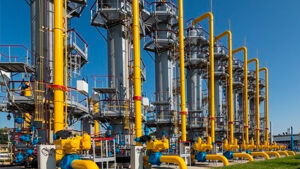
Naftogaz of Ukraine is negotiating gas storage deals with Germany’s RWE, Norway’s Equinor, France’s TotalEnergies and Engie, the group’s CEO Oleksiy Chernyshov told Bloomberg.
According to him, there is still time to conclude agreements, as the largest volumes of gas injection usually occur in August and September.
Chernyshov also clarified that so far no foreign company that already stores gas in Ukraine has abandoned its decisions, despite the recent Russian attacks on gas infrastructure.
The company continues to serve customers and repair equipment damaged by recent rocket attacks.
The Head of the NJSC reminded that the state energy regulator has recently improved the conditions for gas storage from June 1, 2024. The new rules include shorter booking intervals for capacity – for months rather than for a whole year, which improves the attractiveness of Ukrainian storage facilities for foreign traders.
As reported, in 2023, the volume of gas from foreign traders and energy companies pumped into Ukrainian UGS facilities for storage reached 2.5 bcm. This year, Naftogaz expects to increase this figure to 4 bcm.
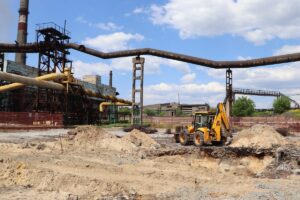
Metinvest Group’s Kametstal plant, which was built at the facilities of Dnipro Metallurgical Plant (DMK, Kamianske, Dnipro region), has implemented an investment project to stabilize coke oven gas pressure in the plant’s system to improve energy efficiency and energy independence.
According to a press release, Kametstal has implemented an investment project aimed at stabilizing coke oven gas pressure in the plant’s system as part of the introduction of modern technologies to improve economic efficiency and energy independence.
At the same time, it is specified that comprehensive tests of the installation of a coke oven gas storage system in gas collectors with the possibility of returning to the plant’s gas system have been completed at the site of the company’s power plant. The project is based on a modern technology for collecting excess coke oven gas that occurs in the network during the coke production process into soft gas holders to use it for the needs of the enterprise.
The infrastructure of the new complex, in addition to the pressure stabilization system equipment site, where two soft gas holders are installed – each with a filling volume of almost 580 cubic meters of gas, also includes a compressor building with two turbochargers for pumping gas and one air compressor, a condensate collection unit, technological networks and other equipment.
It is emphasized that the use of soft synthetic gas collectors is the latest approach to gas storage. Their advantages over metal ones include, first of all, an economical and less labor-intensive installation phase, as well as improved working conditions for personnel during maintenance during operation. The gas storage complex is fully automated and equipped with a preventive process safety system.
“The implementation of this investment project is another step of the enterprise and the company towards the priority goal of stable production. In the future, the coke oven gas storage unit will allow us to use this high-calorie gas more efficiently without losing its excess volumes. This is an opportunity to be more energy independent within the framework of the enterprise’s needs and increase the efficiency of production processes,” explained Mikhail Koptev, Director for Capital Construction and Investments.
“KAMETSTAL was established on the basis of PJSC Dnipro Coke and Chemical Plant (DCKhZ) and Centralized Steel Works of PJSC Dnipro Metallurgical Plant (DMK).
According to the 2020 report of Metinvest Group’s parent company, Metinvest B.V. (Netherlands) owned 100% of the shares in DCCP.